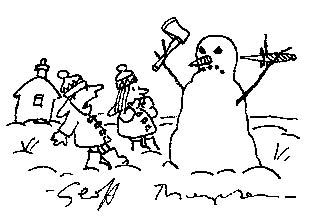The presenter on BBC Radio 4’s Today programme was doing a quick round-up of the weather on a freezing December morning, just before signing off at 9 a.m. Very cold all over Britain, he said. Later there would be ‘snow in the north of the country’. ‘Which country?’ I thought.
It was an immediate and unconsidered reaction; and of course on reflection context often does make clear. But not in this case. I still don’t know which country Today meant. If the country they were referring to was Great Britain then they must have meant snow in Scotland. If it was England they were talking about then we in the north Midlands were due for snow too.
A small confusion, and slight enough. But faintly it troubled me. As an Englishman, and as 2010 drew to a close, I was experiencing for the first time the thought that, when directed towards a predominantly English audience, the ordinary and natural meaning of ‘the country’ might now be England.
Another year has passed, and Scotland has quietly slipped just a little further from our English thoughts. The drift is continuous and very gentle, as with someone to whom you’ve once been close, someone who at one time was always in your thoughts; and later there’s been no big bust-up or walkout, but two lives have almost imperceptibly diverged until one day you wake and up and think ‘How’s old so-and-so?’ and realise it’s been a year since you spoke. These partings are almost more melancholy than those of the schismatic sort.
There was a time, and not so long ago, when as the Times’s political sketchwriter I would quite often have been asked to cover a by-election in Scotland, or Scottish constituencies at a general election. I ranged from Glasgow to Fife to Shetland. I never felt I was treading on any toes, or straying outside my brief. But were I a sketchwriter now I would think twice about covering a Scottish event, except as an oddity: ‘An Englishman’s view’.
I’m aware of one reasonable Scottish response to the above: ‘So what? Scotland hasn’t drifted away; hasn’t moved at all. Whether the English are thinking about us, and how they see us, is a matter for them.’ It’s hard to quarrel with that — but I’m not trying to, for this column is not about Scotland, but about England. ‘English nationhood,’ say the commentators this December, ‘is resurgent. The English are beginning to identify themselves with England, rather than Britain.’
Various explanations for this are ventured. One is football, the flag of St George, and (not unrelated) the increasingly populist nature of our mass culture, where sporting championships are organised within and between the constituent parts, not the whole, of the United Kingdom. It anyway always tended to be the grander sort of Englishman who in plummy tones held forth about the Union: patricians have typically felt a stronger sense of ownership of the whole United Kingdom than the plebs — if only to pursue field sports north of the border.
A second explanation is the growing acknowledgement of the political separation between England and Scotland. We English perhaps sense a need for our own matching patriotism, south of the border. A third explanation is the new Tory-led government — an overwhelmingly English affair because the Tories hardly win seats in Scotland these days. It was not so easy to feel that we English governed ourselves when the Prime Minister and, it seemed, half the Cabinet were Scots.
I dare say there’s a measure of truth in all these accounts of our growing sense of Englishness, but I’d tentatively suggest a very different one. I submit that Englishness isn’t growing at all; it’s just unmasking itself.
Our self-identification as English has always been strong. By ‘Britain’ we English always meant England anyway, so our British patriotism was really English patriotism marching behind the colours of the Union flag. All we’re doing now is dropping the respectful deference we used to show to the smaller bits of our nation — bits which, in truth, we half thought of as possessions. We no longer feel a polite need to pretend they were more than optional add-ons to the main event, which was always, and remains, England. We thought it was the Scots who wanted us to use the term ‘Britain’ and we politely complied. Now we discover they’ve gone off the idea. Fine. So let’s call it England again. We’ve always known we were the boss nation: the nomenclature was therefore secondary.
I caricature; but what I caricature — the collective shrug of English shoulders: ‘very well then, “England”’ — is palpable. I’m perhaps wrong to talk about Scotland drifting away. It is England that’s drifting away. More than a decade ago I wrote a column that I seem to remember upset Andrew Marr, suggesting that England should consider leaving the United Kingdom. In a strange way, I wonder whether this might be what is happening now: not as a conscious act of secession; more as a subliminal but gathering focus on our own affairs, coupled with a growing acknowledgment that the rest is peripheral. This may surface embarrassingly when (once the 2011 elections in Scotland are over) we return next summer to the case for England’s staying an hour ahead of GMT in the winter: a trivial issue, but one which may crystallise the deeper feelings.
My grandparents used to say ‘England’ when, I would remind them, they really meant ‘Britain’. Half a century later I’m coming to the conclusion that I was wrong. They did mean England. And so did their children and grandchildren, all along. It’s becoming respectable to say so again.







Comments